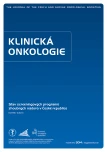Implementation of Performance Indicators in the Czech Breast Cancer Screening Programme – Results of the Regular Monitoring
Authors:
O. Májek 1,2; H. Bartoňková 3; J. Daneš 4; M. Skovajsová 5; L. Dušek 1,2
Authors‘ workplace:
Institut bio statistiky a analýz, LF a PřF MU, Brno
1; Ústav zdravotnických informací a statistiky ČR, Praha
2; Oddělení radiologie, Masarykův onkologický ústav, Brno
3; Radiologická klinika 1. LF UK a VFN v Praze
4; Breast Unit Prague, Mamma centrum Háje, Praha
5
Published in:
Klin Onkol 2014; 27(Supplementum 2): 113-123
doi:
https://doi.org/10.14735/amko20142S113
Overview
The Czech organised breast cancer screening programme was initiated in 2002. Collection of data on screening mammography examinations, subsequent diagnostic procedures, and final diagnosis is an indispensable part of the programme. Data collection is obligatory for all accredited centres, in accordance with regulations issued by the Czech Ministry of Health. This contribution aims to demonstrate the recent results of quality monitoring of the accredited centres. Quality indicators, whose definition complies with international standards, involve the women’s participation, the volume of performed examinations, the accuracy of screening mammography, the use of pre‑operative diagnostics, and the proportion of early detected tumours. Our evaluation documents a continuous improvement in quality of the Czech mammography screening programme, which is thereby in full agreement with international recommendations on quality assurance.
Key words:
breast neoplasms – mass screening – mammography – health care quality indicators
This study was supported by the project 36/14//NAP “Development and implementation of methodology for the evaluation of effectiveness of personalised invitations of citizens to cancer screening programmes” as part of the programme of the Czech Ministry of Health “National action plans and conceptions”.
The authors declare they have no potential conflicts of interest concerning drugs, products, or services used in the study.
The Editorial Board declares that the manuscript met the ICMJE “uniform requirements” for biomedical papers.
Submitted:
18. 9. 2014
Accepted:
24. 10. 2014
Sources
1. Majek O, Danes J, Zavoral M et al. Czech National Cancer Screening Programmes in 2010. Klin Onkol 2010; 23(5): 343−353.
2. Májek O, Dušek L, Mužík J et al. Systém informační podpory národních programů screeningu zhoubných nádorových onemocnění v ČR. Lékař a technika 2011; 41(1): 55−66.
3. Majek O, Danes J, Skovajsova M et al. Breast cancer screening in the Czech Republic: time trends in performance indicators during the first seven years of the organised programme. BMC Public Health 2011; 11 : 288. doi: 10.1186/ 1471 ‑ 2458 ‑ 11 ‑ 288.
4. Perry N, Broeders M, de Wolf C et al (eds). European guidelines for quality assurance in breast cancer screening and diagnosis, 4th ed. Luxembourg: Office for Official Publications of the European Communities 2006.
5. Májek O, Daneš J, Zavoral M et al (eds). Stav screeningových programů zhoubných nádorů v České republice a metodika adresného zvaní občanů. Brno: Masarykova univerzita 2013.
6. Blaha M, Janča D, Klika P et al. Project I ‑ COP − architecture of software tool for decision support in oncology. In: Blobel B, Hasman A, Zvárová J (eds). Data and knowledge for medical decision support: proceedings of the EFMI special topic conference, 17−19 April 2013. Prague: IOS Press 2013.
7. Hofvind S, Ponti A, Patnick J et al. False ‑ positive results in mammographic screening for breast cancer in Europe: a literature review and survey of service screening programmes. J Med Screen 2012; 19 (Suppl 1): 57−66.
8. Lynge E, Ponti A, James T et al. Variation in detection of ductal carcinoma in situ during screening mammography: a survey within the International Cancer Screening Network. Eur J Cancer 2014; 50(1): 185−192. doi: 10.1016/ j.ejca.2013.08.013.
9. Sahin AA, Guray M, Hunt KK. Identification and biologic significance of micrometastases in axillary lymph nodes in patients with invasive breast cancer. Arch Pathol Lab Med 2009; 133(6): 869−878. doi: 10.1043/ 1543 ‑ 2165 ‑ 133.6.869.
Labels
Paediatric clinical oncology Surgery Clinical oncologyArticle was published in
Clinical Oncology

2014 Issue Supplementum 2
- Possibilities of Using Metamizole in the Treatment of Acute Primary Headaches
- Metamizole at a Glance and in Practice – Effective Non-Opioid Analgesic for All Ages
- Metamizole vs. Tramadol in Postoperative Analgesia
- Spasmolytic Effect of Metamizole
- Metamizole in perioperative treatment in children under 14 years – results of a questionnaire survey from practice
-
All articles in this issue
- Results of the Czech National Colorectal Cancer Screening Programme – Faecal Occult Blood Tests
- Results of the Czech National Colorectal Cancer Screening Programme – Colonoscopy Examinations
- Performance Indicators in Screening Programmes
- Implementation of Performance Indicators in the Czech Breast Cancer Screening Programme – Results of the Regular Monitoring
- National Web Portals as an Official Communication Platform of Cancer Screening Programmes
- Role and Importance of Civil Society Organisations in the Support of Cancer Screening
- New European Information and Communication Platform Striving for Improved Care for Colorectal Cancer Patients – www.crcprevention.eu
- Objective Need for Cancer Prevention in the Czech Republic and Europe, and the State Thereof
- Epidemiology of Screening‑ targeted Cancers According to New Data of the Czech National Cancer Registry
- Epidemiology of Cancers with Implemented Screening Programmes in an International Comparison
- State and Development of Background Information for the Evaluation of Czech Cancer Screening Programmes
- Approach to Population‑based Screening in the Czech Republic, Methodology and First Results of the Personalised Invitation of Citizens to Cancer Screening Programmes
- Results of the Czech National Breast Cancer Screening Programme
- Results of the Czech National Cervical Cancer Screening Programme
- Clinical Oncology
- Journal archive
- Current issue
- About the journal
Most read in this issue
- Performance Indicators in Screening Programmes
- Results of the Czech National Cervical Cancer Screening Programme
- Results of the Czech National Breast Cancer Screening Programme
- Results of the Czech National Colorectal Cancer Screening Programme – Colonoscopy Examinations
